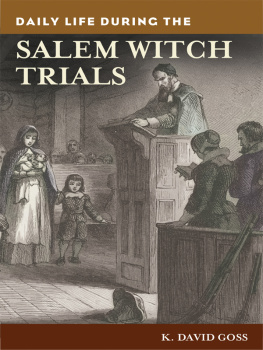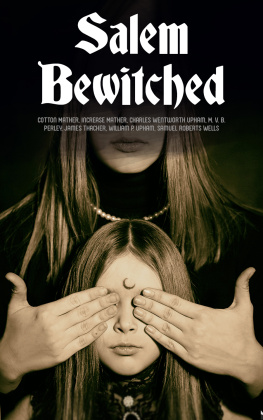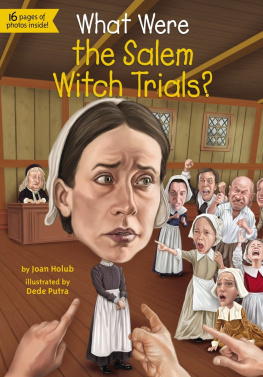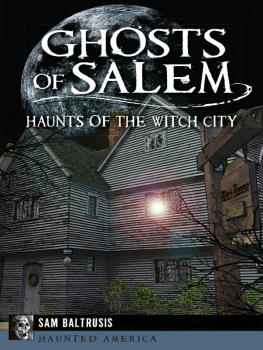Frances Hill - The Salem Witch Trials Reader
Here you can read online Frances Hill - The Salem Witch Trials Reader full text of the book (entire story) in english for free. Download pdf and epub, get meaning, cover and reviews about this ebook. year: 2009, publisher: Hachette Books, genre: Non-fiction. Description of the work, (preface) as well as reviews are available. Best literature library LitArk.com created for fans of good reading and offers a wide selection of genres:
Romance novel
Science fiction
Adventure
Detective
Science
History
Home and family
Prose
Art
Politics
Computer
Non-fiction
Religion
Business
Children
Humor
Choose a favorite category and find really read worthwhile books. Enjoy immersion in the world of imagination, feel the emotions of the characters or learn something new for yourself, make an fascinating discovery.

- Book:The Salem Witch Trials Reader
- Author:
- Publisher:Hachette Books
- Genre:
- Year:2009
- Rating:4 / 5
- Favourites:Add to favourites
- Your mark:
- 80
- 1
- 2
- 3
- 4
- 5
The Salem Witch Trials Reader: summary, description and annotation
We offer to read an annotation, description, summary or preface (depends on what the author of the book "The Salem Witch Trials Reader" wrote himself). If you haven't found the necessary information about the book — write in the comments, we will try to find it.
The Salem Witch Trials Reader — read online for free the complete book (whole text) full work
Below is the text of the book, divided by pages. System saving the place of the last page read, allows you to conveniently read the book "The Salem Witch Trials Reader" online for free, without having to search again every time where you left off. Put a bookmark, and you can go to the page where you finished reading at any time.
Font size:
Interval:
Bookmark:

SALEM
WITCH
TRIALS
Reader


The author wishes to note:
The excerpt from Salem Possessed by Paul Boyer and Stephen Nissenbaum was reprinted by permission of the publisher, Cambridge, Mass.: Harvard University Press, Copyright 1974 by the President and Fellows of Harvard College.
Arthur Millers Why I Wrote The Crucible reprinted by permission of International Creative Management Inc. and originally published in The New Yorker (October 21 & 28, 1996).
All rights reserved. Printed in the United States of America. No part of this publication may be reproduced or transmitted in any form or by any means, electronic or mechanical, including photocopy, recording, or any information storage and retrieval system, without permission in writing from the publisher.
Hill, Frances, 1943
The Salem witch trials reader / by Frances Hill.
p. cm.
Includes bibliograpical references and index.
ISBN-10: 0-306-80946-X ISBN-13: 978-0-306-80946-0
eBook ISBN:9780786748389
1. WitchcraftMassachusettsSalemHistorySources. 2. Trials
(Witchcraft)MassachusettsSalem. 3. Salem (Mass.)HistorySources. I. Title.
BF1576.H55 2000
133.43097445dc21 00-043163
Text Design by Jeff Williams
Set in 10 point Minion by the Perseus Books Group
Published by DaCapo Press
A Member of the Perseus Books Group
http://www.perseusbooksgroup.com
The paper used in this publication meets the requirements of the American National Standard for Permanence of Paper for Printed Library Materials Z39.48-1984.
For Daniel Jenkins, with love
I would like to thank the staff of the Peabody Essex Museum, Salem, Massachusetts, and especially the chief librarian, William la Moy, for all their help, even down to the thoughtful offer of a piece of string weighted at each end for holding open books while taking notes.
My thanks to Richard Trask, archivist at the Danvers Archival Center, Danvers, Massachusetts, for providing me with the photograph of the 1689 covenant of the Church of Christ at Salem Village.
My special gratitude goes to Alison dAmario, inspired education director of the Salem Witch Museum, Salem, Massachusetts, who has been a rock of support.
My thanks as ever to Leon Arden for reading the manuscript and making many helpful suggestions.
Note: I have modernized the spelling and punctuation of the contemporary records to prevent any chance of confusion; however, I have been careful never to alter the meaning.
Persons Hanged for Witchcraft During 1692
| JUNE 10 | BRIDGET BISHOP |
| JULY 19 | SARAH GOOD |
| JULY 19 | ELIZABETH HOWE |
| JULY 19 | SUSANNAH MARTIN |
| JULY 19 | REBECCA NURSE |
| JULY 19 | SARAH WILDES |
| AUGUST 19 | GEORGE BURROUGHS |
| AUGUST 19 | MARTHA CARRIER |
| AUGUST 19 | GEORGE JACOBS |
| AUGUST 19 | JOHN PROCTOR |
| AUGUST 19 | JOHN WILLARD |
| SEPTEMBER 19 | GILES COREY (pressed to death) |
| SEPTEMBER 22 | MARTHA COREY |
| SEPTEMBER 22 | MARY EASTY |
| SEPTEMBER 22 | ALICE PARKER |
| SEPTEMBER 22 | MARY PARKER |
| SEPTEMBER 22 | ANN PUDEATOR |
| SEPTEMBER 22 | MARGARET SCOTT |
| SEPTEMBER 22 | WILMOT REDD |
| SEPTEMBER 22 | SAMUEL WARDWELL |
Persons Accused of Witchcraft Who Died in Jail
| MAY 10, 1692 | SARAH OBSORNE |
| JUNE 16, 1692 | ROGER TOOTHAKER |
| DECEMBER 3, 1692 | ANN FOSTER |
| MARCH 10, 1693 | LYDIA DUSTIN |
| An unnamed infant of Sarah Good died prior to July 19, 1692. |
The historical significance of the Salem witch trials cannot be overestimated. They were a turning point in the transition from Puritanism, with its values of community, simplicity, and piety, to the new Yankee world of individualism, urbanity, and freedom of conscience. Yet their significance transcends the purely historical. They provide an astonishingly clear and instructive model of the universal and timeless processes by which groups of human beings instigate, justify, and escalate persecution. Precisely because the numbers of people involved in the Salem witch-hunt, and the timescale of events, were on a small scale, the steps are easy to trace by which a few deranged, destructive human beings led ordinary mortals down the dark paths of fear, hatred, and envy to demonize and destroy innocent victims. When those steps are understood, the recurrent persecutions in human history, whether ethnic, religious, political, or superstitious, become less hard to comprehend.
The monster may be Hitler or Slobodan Milosevic. Or Senator Joe McCarthy. Or the mentally disturbed mother of a small child in a day care center in California in 1983. Or Samuel Parris in Salem Village in 1692. Whether operating nationwide or in a tiny community, the disturbed individuals extreme egomania and rage sow the seeds of persecution. These grow quickly in the fertile ground of anxiety and intolerance where particular groups, real or imagined, have already been scapegoated. The majority, who project their own envy, destructive-ness, and illicit desires onto those scapegoats, are now encouraged to demonize them further. Soon Nazi party workers, or Serbian politicians and soldiers, or U.S. Senators, or Californian district attorneys and child abuse experts, or seventeenth century Massachusetts ministers and magistrates, develop agendas that motivate them to push demonization to its ultimate limits. Careers are furthered and nests feathered. People with grievances, formerly powerless, are handed a weapon for settling old scores. As persecution mounts, it becomes risky to oppose it. Those with no other motive but to live quiet lives keep their doubts to themselves. Eventually the rule of law is suspended or perverted so that just means can be found to punish or destroy those perceived as the enemy.
The five persecutions I have cited differ vastly in the historical factors that allowed them to happen. The rise of Hitler would not have been possible without the legacy of Germanys defeat in the First World War. Milosevics ethnic cleansing took place in the context of the centuries old conflict in the Balkans. Joe McCarthys campaign against Communists was created by the Cold War. The accusations of Satanic child sex abuse against seven innocent people in the McMartin case in California, and against other innocents in a rash of subsequent similar cases, emerged from the superstitions of born-again Christians linked with the genuine concerns of social workers about child sex-abuse.
In Salem, the witch-hunt took place against the background of a Puritan theocracy threatened by change, in a population terrified not only of eternal damnation but of the earthly dangers of Indian massacres, recurrent smallpox epidemics, and the loss of the charter from England. It was triggered by the hysteria of a small group of girls in a village rent by bitter local conflicts.
Font size:
Interval:
Bookmark:
Similar books «The Salem Witch Trials Reader»
Look at similar books to The Salem Witch Trials Reader. We have selected literature similar in name and meaning in the hope of providing readers with more options to find new, interesting, not yet read works.
Discussion, reviews of the book The Salem Witch Trials Reader and just readers' own opinions. Leave your comments, write what you think about the work, its meaning or the main characters. Specify what exactly you liked and what you didn't like, and why you think so.






